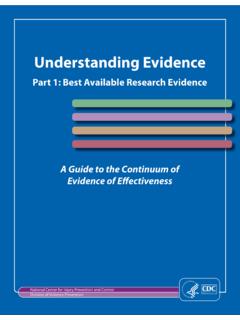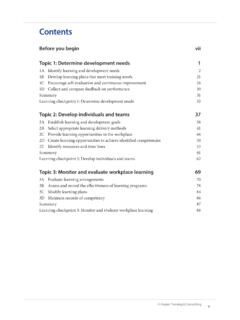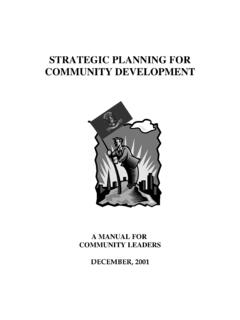Transcription of The Effects of School Feeding Programme on Enrolment and ...
1 World Journal of Education Vol. 6, No. 3; 2016 Published by Sciedu Press 39 ISSN 1925-0746 E-ISSN 1925-0754 The Effects of School Feeding Programme on Enrolment and Performance of Public Elementary School Pupils in Osun State, Nigeria Adekunle, D. Taylor1 & Christiana, O. Ogbogu1,* 1 Department of Public Administration, Obafemi Awolowo University, Ile-Ife, Nigeria *Correspondence: Department of Public Administration, Obafemi Awolowo University, Nigeria. Tel: 234-803-426-5522. E-mail: Received: February 4, 2016 Accepted: March 24, 2016 Online Published: June 2, 2016 URL: Abstract The study assessed the School Feeding Programme of public elementary School pupils in Osun State, Nigeria. It was done with a view to determine its Effects on School Enrolment , retention, and academic performance of the pupils.
2 It also elicited the challenges encountered in the implementation of the Programme . The study adopted the survey research design and obtained its data from primary and secondary sources. The primary data were obtained through a structured questionnaire administered on116 respondents in 10 randomly selected public elementary schools in Osun State. The questionnaire was complemented by in-depth interview of 23 purposively selected officers involved in the implementation and monitoring of the School Feeding Programme . The retrieved data were analysed using descriptive statistics. The results showed that pupils are fed daily through the School Feeding Programme (87%), which is funded through cost sharing between the State and local governments (78%). It was also found that the School Feeding Programme in Osun State has resulted in an increase in pupils Enrolment ( ), retention ( ), as well as regularity ( ) and punctuality (69%) in School attendance.
3 It has also enhanced the pupils performance in curricular and extracurricular activities ( ). The major challenges were found to be insufficient funding ( ), insufficient classrooms and furniture to cope with increase in Enrolment ( ), heavy workload for teachers ( ) and lack of effective monitoring and evaluation system ( ).The study concluded that the School Feeding Programme in Osun State has increased the Enrolment and improved the performance of elementary School pupils in the state. Keywords: public elementary School ; School Feeding Programme ; Enrolment ; performance; Osun state; Nigeria 1. Introduction School Feeding programmes constitute critical interventions that have been introduced in many developed and developing countries of the world to address the issue of poverty, stimulate School Enrolment and enhance pupils performance.
4 In developing countries, almost 60million children go to School hungry everyday and about 40 percent of them are from Africa. Providing School meals is therefore vital in nourishing children. Parents are motivated to send their children to School instead of keeping them at home to work or care for siblings (Akanbi, 2013).The introduction of the School Feeding is traced to the Millennium Development Goals (MDGs) initiative and several conferences held thereafter by African leaders which aimed to tackle issues, such as peace, security, good economic, political and corporate governance and to make the continent an attractive destination for foreign investment. Some of these developments include the New Partnership for African Development which according to the blueprint is a pledge by African leaders, based on common vision and a firm and shared conviction, to eradicate poverty and to place their countries on the path of sustainable growth and development and, at the same time, to participate actively in the world economy and politics.
5 Also, the Comprehensive African Agriculture Development Programme and the Millennium Hunger Task Force amongst others were initiatives which were designed to link School Feeding to agricultural development through the purchase and use of locally produced food (Bundy et al, 2009). Nigeria happened to be one of twelve (12) pilot countries invited to implement the Programme . So far, Nigeria, Cote d ivore, Ghana, Kenya and Mali commenced the implementation of the School Feeding Programme . As a result, the Federal Government came up with the Universal Basic Education Act in 2004, which provided the enabling World Journal of Education Vol. 6, No. 3; 2016 Published by Sciedu Press 40 ISSN 1925-0746 E-ISSN 1925-0754 legislative backing for the execution of the Home Grown School Feeding and Health Programme .
6 Towards the realization of the objectives of the Universal Basic Education Programme and the central role of nutrition, the Federal Ministry of Education launched the Home Grown School Feeding and Health Programme in 2005. The overall goal of the School Feeding Programme in Nigeria is to reduce hunger and malnutrition among School children and enhance the achievement of Universal Basic Education. Osun was among the twelve (12) States selected to begin a phased pilot roll out implementation of the Programme . Although The Home Grown School Feeding and Health Programme was launched, it did not receive attention until the change of government in the State in November, 2010. Subsequently, the new administration, under the leadership of Ogbeni Rauf Aregbesola convened an education summit headed by Professor Wole Soyinka.
7 The summit s objective was to critically examine the problems hampering growth and progress of education in the State and to proffer workable solutions. At the end of the Summit, recommendations were made towards repositioning education in Osun State which among others included the School Feeding Programme transformation. Thereafter, a comprehensive review of the old School Feeding Programme was undertaken. The Programme was re-packaged and christened Osun Elementary School Feeding and Health Programme O meals It was formally launched in the State on 30th April, 2012 with the pupils in Grades 1-3 of the Public Primary Schools in the State being fed with one meal per day(Ministry of Education,2014). Literature abound on the benefits of School Feeding Programme to pupils but not much has been done to highlight the impact of the Programme on School Enrolment , retention and pupils academic performance.
8 This study therefore seeks to fill the gap by assessing School Feeding Programme as it is being implemented in Public Elementary schools in Osogbo, Osun State, Nigeria. 2. Literature Review The Concept and Origin of School Feeding Programme School Feeding is simply the provision of food to children through schools. According to Oyefade (2014), different countries have one or a combination of the two Feeding modalities in place for various objectives. However, they can be grouped into two broad categories: in- School meals and take-home rations where families are given food if their children attend School . Historically, in- School meals have been the most popular modality of School Feeding interventions. The School Feeding can be in turn grouped into two common categories: Programme that provides meals and Programme that provides high-energy biscuits or snacks to generate greater impacts on School Enrolment , retention rates, and reduce gender or social gaps (Akanbi, 2013).
9 Uduku, (2011) contended that there are `indications of a significant swing in thinking about School Feeding and many elements of this new thinking are being promoted keenly under the rubric of home grown School Feeding . Tomlinson (2007) traced the emergence of School Feeding Programme to the 1930s in the United Kingdom and the United States of America with a focus on improving the growth of children. In 1900 Netherlands became the first country to move the Programme to a new level of incorporating School meals into a national legislation. By the 1930s, the United Kingdom and the United States had also instituted the School Feeding Programme as part of their national programmes. A further account indicates that School Feeding initiatives have been in existence since the late 1700 s and originated as projects of donors in Europe. The United States of America began the practice of initiating School Feeding programmes in Austria as an act of international aid focused on combating the severe malnutrition of children in the 1940s after the Second World War.
10 Since then, School Feeding programmes have become a key part of food assistance, relief emergency and development programmes. School Feeding Programme is a social safety net for children and as part of the national development goals. It provides an important new opportunity to assist poor families and feed hungry children. It provides incentive for poor families to send their children to School and keep them there. In order to improve the nutritional status of School children, the Federal Government of Nigeria launched the Home-Grown School Feeding and Health Programme in September, 2005 under the coordination of the Federal Ministry of Education. The Programme aimed to provide pupils with adequate meal during the School day (FME, 2007). The scheme, officially known as Home Grown School Feeding Programme insisted on buying the foodstuffs from the local farmers.

















